 VIDEO PODCAST: John Dante Prevedini leads a discussion about Classical Music and Artificial Intelligence, including contributions from George Coulouris, Michael Stephen Brown, April Fredrick, Adrian Rumson and David Rain.
VIDEO PODCAST: John Dante Prevedini leads a discussion about Classical Music and Artificial Intelligence, including contributions from George Coulouris, Michael Stephen Brown, April Fredrick, Adrian Rumson and David Rain.
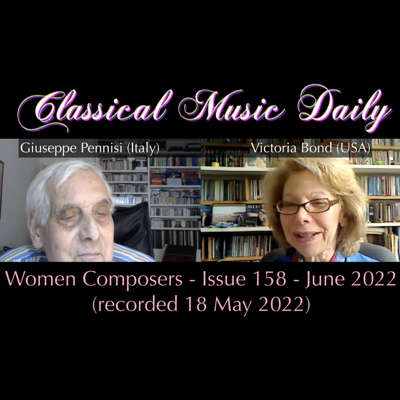 VIDEO PODCAST: Women Composers - Our special hour-long illustrated feature on women composers includes contributions from Diana Ambache, Gail Wein, Hilary Tann, Natalie Artemas-Polak and Victoria Bond.
VIDEO PODCAST: Women Composers - Our special hour-long illustrated feature on women composers includes contributions from Diana Ambache, Gail Wein, Hilary Tann, Natalie Artemas-Polak and Victoria Bond.
Regietheater at the Rossini Opera Festival
GIUSEPPE PENNISI discusses recent performances of 'Il Signor Bruschino' and 'Elisabetta, Regina d'Inghilterra'
The second and third new productions of the Rossini Opera Festival (ROF) should be a starting point for a serious reflection on the merits and limits of regietheater, in which the director of the scenic action (and often also the creator of the sets and costumes) becomes the real protagonist of the production, often more than the conductor and singers. Recall that at the time of the Italian melodrama of the nineteenth century and the verismo opera of the first half of the twentieth century, the stage director usually had only the role of implementing the 'scenic notes' by the librettist and by the composer. Only in the last decades of the twentieth century did regietheater became important, first in Germany and then in the rest of the world. We have also begun to talk about La traviata by Luchino Visconti (rather than by Giuseppe Verdi) and La bohème by Franco Zeffirelli (rather than by Giacomo Puccini). The ROF productions are the one act farce Il Signor Bruschino and the two act opera seria Elisabetta, Regina d'Inghilterra.
Readers of this daily magazine know that I am in favour of regietheater, and also of the change of place and era of the action, provided that it is respectful to the score and the basic ideas of the work.
The ROF has been and is the Italian opera festival that most focused on regietheater (often successfully) helping to launch directors such as Damiano Micheletto and bringing back to his homeland directors such as Giancarlo Del Monaco (of which I still remember a great unconventional Otello).
After the grand opening with Moïse et Pharaon, masterfully directed by Pier Luigi Pizzi, the ROF entrusted these new productions of Il Signor Bruschino and Elisabetta, Regina d'Inghilterra to directors who, rightly and wrongly, consider themselves innovators. Pizzi was and still is an innovator at the age of ninety-one and has no need to be considered as such.
Il Signor Bruschino was a resounding flop at the time, but after the debut it happily entered the repertoire. Elisabetta, Regina d'Inghilterra was, instead, a great success, especially because of the protagonist Isabella Colbran who became the composer's first wife; it is rarely staged because of the vocal difficulties it entails - Colbran was an 'amphibious soprano', meaning that she was able to soar to a sensational treble and to descend to an almost contralto register. For both works, the productions were based on regietheater. In my view, this did not do well for either. I was in the theatre at the previews on 7 and 8 August 2021.
Bruschino is a staple often offered by the Festival. This is - I think - the fourth production, a joint venture with the Teatro Comunale di Bologna and the Royal Opera House in Muscat. It is a simple farce that would be nice to see set, as per the libretto, in an early nineteenth century manor. A few years ago, a ROF production took the story to a shopping mall – a theme amusement park (about Rossini) where tourists, presumably Anglo-American or northern European, witness a rehearsal of the farce. It was a young show aimed at young people. The stage direction was curated by the collective group Teatro Sotterraneo. The sets and costumes were by the Academy of Fine Arts of Urbino. It was a good example of regietheater.
In this production, the duo Barbe & Doucet moves the story to a sailing ship at the beginning of the twentieth century.
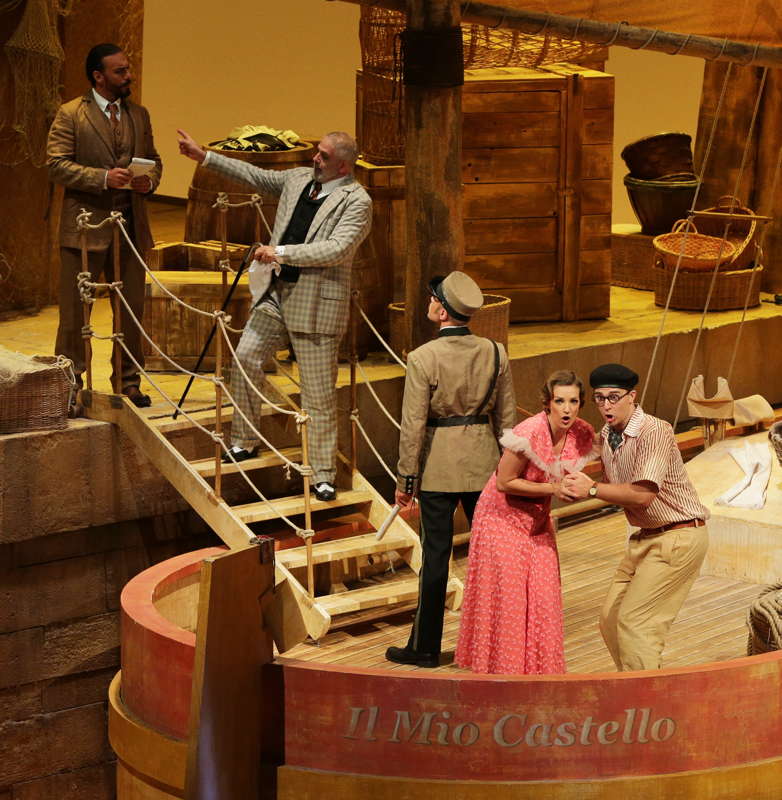
A scene from 'Il Signor Bruschino' at the Rossini Opera Festival. Photo © 2021 Studio Amati Bacciardi
The protagonist, Gaudenzio, who should be an elderly man eager for young women, has the attractive and elegant features of Giorgio Caoduro - a former student of the Rossinian Academy, today one of the best coloratura baritones on the market.
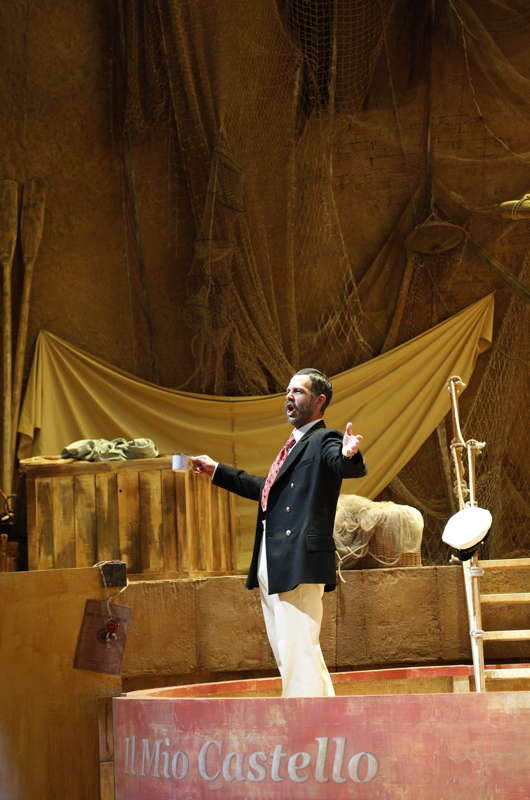
Giorgio Caoduro as Gaudenzio in 'Il Signor Bruschino' at the Rossini Opera Festival. Photo © 2021 Studio Amati Bacciardi
In addition, the action takes place almost entirely on one side of the stage. Given that, due to Covid restrictions, the orchestra is in the stalls area and the audience is in the boxes - two people per box. Only half of the spectators see the stage action that is largely placed on the quay rather than on the sailing ship and the lifeboat next to the vessel. All viewers have the right, especially in a farce, to know what is happening on stage. Barbe & Doucet say they conceived the show before COVID. In a year and a half, they failed to calibrate it to take account of the new situation?! It would be desirable for them to review their direction before the production is shown in Bologna and in Muscat. They risk an icy reception.
Fortunately, there is the music by a young Rossini full of panache. The Filarmonica Gioacchino Rossini conducted by Michele Spotti was very good. In the voice cast, Giorgio Caoduro and Pietro Spagnoli excelled. Marina Monzò, Jack Swanson and Manuel Amati were worth noting.
Regietheater has, however, made it difficult to correct Elisabetta, Regina d'Inghilterra. The stage director is Davide Livermore. The sets are by Giò Forma, the costumes by Gianluca Falaschi, the lighting by Nicolas Bovey and the obsessive videos by D-Work. The production is a joint venture with the Teatro Massimo in Palermo.
The plot is the usual one of the sad love between Elizabeth Queen of England and Leicester, in the intrigues of the Court. The ending is happy, in line with the practice of opera seria of the time. Rossini had to compose the work in a very short time and therefore made extensive use of 'self-quotes': pieces taken from his other works and recycled.
The issue is not the shift of the action to the years between the first and second world wars. The problem is that the plot, however very dramatic and pre-romantic, is proposed as a parody of television series such as The Crown or The Royals, immersing the stage with bad videos and forcing the singers to sing in unusual positions : for example, the tenor must sing part of his main aria, starting lying on the ground. The intention was perhaps to make people laugh.
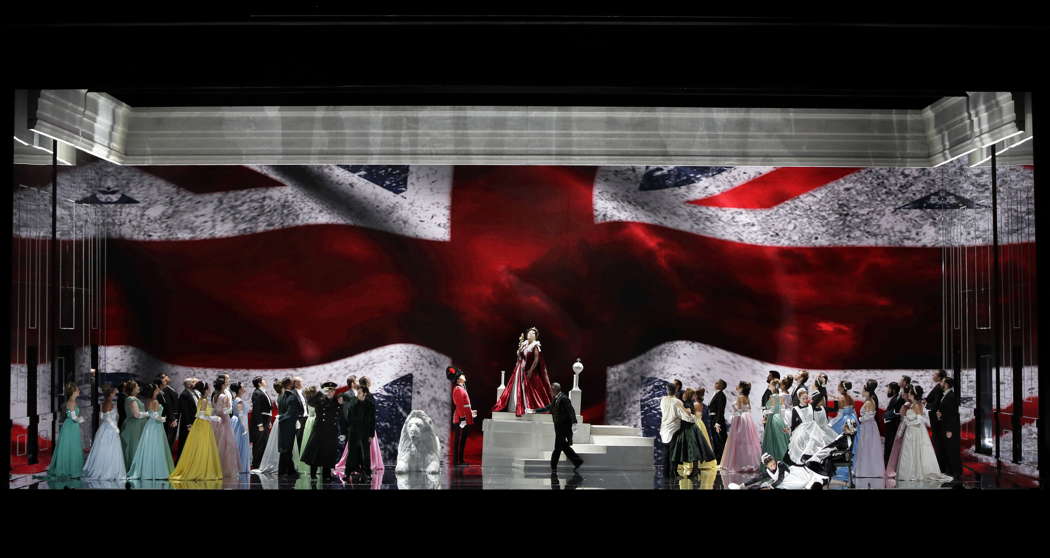
A scene from 'Elisabetta, Regina d'Inghilterra' at the Rossini Opera Festival. Photo © 2021 Studio Amati Bacciardi
In the past, Mr Livermore gave the ROF good productions - eg Ciro in Babilonia - but also questionable staging, as in Demetrio e Polibio. Given the results of the recent Roman La bohème, he would do well to focus on his new position as director of the National Theatre of Genoa.
The musical part? The Rai orchestra, conducted by Evelino Pidò, was less brilliant than in Moïse et Pharaon. The gossips said it was distracted (and baffled) by what was happening on stage, as well as by the videos.
The protagonist was not an 'amphibious soprano', but the French mezzo-soprano Karine Deshayes, in difficulty with the treble but very skilled in coloratura.
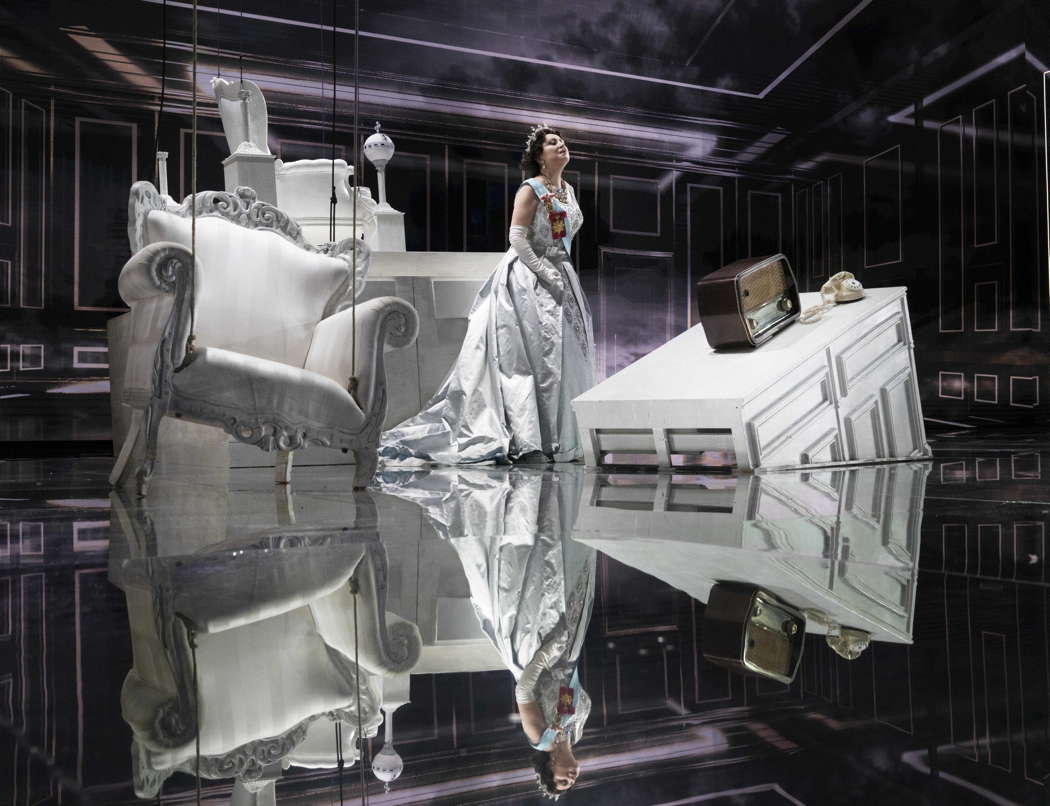
Karine Deshayes in the title role of 'Elisabetta, Regina d'Inghilterra' at the Rossini Opera Festival. Photo © 2021 Studio Amati Bacciardi
The first tenor was the Russian Sergey Romanovsky: a firm central register and generous volume. The soprano was the Georgian Salome Jicia, a coloratura soprano from the Rossini Academy, often present at the ROF, but of whom I remember an unforgettable La straniera by Vincenzo Bellini in Florence. Barry Banks was the second tenor, a coloratura lyric voice, in the role of the 'villain'. Marta Pluva and Valentino Buzza did quite well. With less pretentious stage direction more respectful to Rossini, the production could have been much better.
Copyright © 19 August 2021
Giuseppe Pennisi,
Rome, Italy



